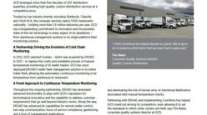Senior Reporter
Congress Moves on HOS

This story appears in the May 23 print edition of Transport Topics.
The U.S. House and Senate last week advanced separate transportation bills that would make changes to the hours-of-service restart rule for truckers that many across the industry have opposed.
A provision that would deny funding to enforce the requirements that drivers take off between 1 a.m. to 5 a.m. on consecutive days — a rule that took effect in 2013 — is included in a fiscal 2017 transportation funding bill a House subcommittee approved May 18.
The following day, the full Senate passed its transportation funding bill that includes a provision that would cap at 73 hours the allowable hours per week truckers may work before taking a break.
Both bills include a measure that would address a technicality in a fiscal 2016 funding law to ensure the Federal Motor Carrier Safety Administration’s 34-hour restart rule in place before 2013 is not abandoned, if an ongoing U.S. Department of Transportation study on the rule does not identify its health benefits. That study is pending.
House Appropriations Committee Chairman Hal Rogers (R-Ky.) indicated his panel would consider the transportation funding bill as early as this week. (Update: Committee action scheduled for May 24.)
“This bill keeps our nation’s transportation infrastructure safe, accessible and more efficient for all travelers,” Rogers said.
“We have said since the broad framework of the current hours-of-service rules went into effect in 2004 complying with these rules improves safety,” American Trucking Associations President Bill Graves said.
“The restart has helped facilitate safety improvements in the trucking industry over the last 10 to 12 years,” added Dave Osiecki, ATA’s chief of national advocacy.
A 2015 funding law suspended the 2013 change to FMCSA’s restart rule pending the DOT study. Truckers have to adhere to pre-July 2013 hours-of-service regulations.
In addition to HOS, the House bill includes two other trucking-related provisions. The bill would prevent California and other states from enacting laws requiring companies to schedule meal and rest breaks for drivers, and it would stop FMCSA from advancing a safety fitness determination rule until reforms to a safety performance scoring program are finalized.
Senior Democrats on the House committee suggested they would look to undo the trucking provisions in the bill. As of press time, the House committee had yet to announce a date to consider the bill.
The meal and rest break measure is aimed mostly at blocking a California law signed in 2011 that requires employers to provide a “duty- free” 30-minute meal break for employees who work more than five hours a day and a second “duty-free” 30-minute meal break for those who work more than 10 hours a day.
On the safety fitness determination provision, House members had been calling on FMCSA to stop pursuing a proposed rule until it reforms its Compliance, Safety, Accountability scoring program. The safety fitness determination proposal would use data from agency and roadside inspections and investigations for the purpose of evaluating monthly if a carrier is fit to operate.
The House and Senate bills would provide funds for myriad DOT programs, such as infrastructure grants, highway safety initiatives and the network of pipelines. On the Senate side, Susan Collins (R-Maine), the bill’s sponsor, said the measure provides “critical investments” for infrastructure projects. Last week, the White House had threatened to veto the bill if senators attached unrelated provisions.
Opposition to changing the HOS rule is led by the Advocates for Highway and Auto Safety, who have called on lawmakers to reject the bills.




